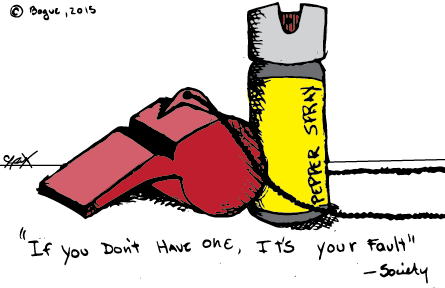
It’s a sad state of affairs when it’s basically a requirement for women to carry pepper spray whenever they walk alone.
It’s even sadder because I don’t need to tell you the reason why. You already know.
One in five college women will be sexually assaulted and/or raped during their college years, according to President Barack Obama’s Task Force to Protect Students From Sexual Assault. We’ve heard this statistic all too often, and strangely it has yet to change. This is because there hasn’t been enough focus on legitimate solutions.
It wasn’t until almost 20 years ago that our nation started addressing the rape problem in our patriarchal society, and the Canadian Federation of Students was one of the first to try to prevent or reduce the rate of rape on college campuses. The organization developed the slogan still used today: “No Means No.”
The slogan is aimed towards deplorable, aggressive men who take advantage of and sexually assault women. While this campaign had good intentions, the slogan implies the faulty assumption that misogynist men will actually listen to and respect a woman’s wishes; “no” doesn’t seem to be in their repertoire.
When simplifying the definition of the word “no” proved to be futile, the rape whistle and pepper spray became widely promoted as devices every woman should have. And while these may be beneficial tools to fend off predators and alert others, they are not actually fixing the problem.
When young women are told they need to go buy pepper spray to defend themselves from rapists, we’re saying “Hey, people are going to try to rape you and there’s nothing we can do about it. So deal with it yourself.”
Women are told to take self-defense classes to protect themselves from predators, to use the buddy system and not go anywhere alone at night. Do this, don’t dress like that, don’t go here and don’t act this way.
We’re putting all the responsibility on women not to get raped. Subsequently, we blame her when she does. This victim blaming translates to shaming and humiliation, often causing the victim of sexual assault to not report the crime. According to the Rape, Abuse & Incest National Network (RAINN), 68 percent of sexual assault crimes go unreported in the U.S.
We need to stop telling women “don’t get yourself raped,” and blaming them for it when it happens, and start teaching men not to rape in the first place. That starts with teaching men at a young age to have respect for women, which could be incorporated into grade school curricula and sex education courses.
Of course not all men assault or rape women, and women are not the only ones who get sexually assaulted. But with the high rates of rape and sexual assault remaining constant, especially on college campuses, and the vast majority of these crimes perpetrated by men towards women, it seems clear that our current solutions need changing.
To address the ineffectiveness of current rape prevention standards, California adopted a bill into law last year to better define what sexual consent actually means. Connected with the “Yes Means Yes” campaign, the law seeks to define affirmative consent, whereas the “No Means No” slogan does not include people who are incapacitated and unable to give consent.
Ultimately, the answer does not rest in a can of pepper spray. We shouldn’t need little gadgets, clothing rules and catchy slogans. Respectful men can be allies for women and role models for young men everywhere. Likewise, independent and self-confident women can be role models for young women, showing them that they don’t have to tolerate disrespect or dated societal norms.




